Old Testament
Genesis Exodus Leviticus Numbers Deuteronomy Joshua Judges Ruth 1 Samuel 2 Samuel 1 Kings 2 Kings 1 Chronicles 2 Chronicles Ezra Nehemiah Esther Job Psalms Proverbs Ecclesiastes Song of Solomon Isaiah Jeremiah Lamentations Ezekiel Daniel Hosea Joel Amos Obadiah Jonah Micah Nahum Habakkuk Zephaniah Haggai Zechariah MalachiSong of Solomon 8:9 Similar Verses
Song of Solomon 8:9 Cross References
If she be a wall, we will build upon her a palace of silver: and if she be a door, we will inclose her with boards of cedar.
Uncover the Rich Themes and Topics of This Bible Verse
Listed below are the Bible themes associated with Song of Solomon 8:9. We invite you to explore each theme to gain deeper insights into the Scriptures.
Song of Solomon 8:9 Cross Reference Verses
This section features a detailed cross-reference designed to enrich your understanding of the Scriptures. Below, you will find carefully selected verses that echo the themes and teachings related to Song of Solomon 8:9 KJV. Click on any image to explore detailed analyses of related Bible verses and uncover deeper theological insights.
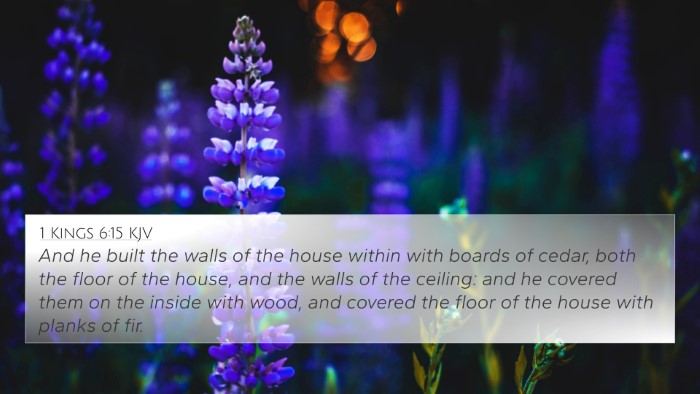
1 Kings 6:15 (KJV) »
And he built the walls of the house within with boards of cedar, both the floor of the house, and the walls of the ceiling: and he covered them on the inside with wood, and covered the floor of the house with planks of fir.

Ephesians 2:20 (KJV) »
And are built upon the foundation of the apostles and prophets, Jesus Christ himself being the chief corner stone;
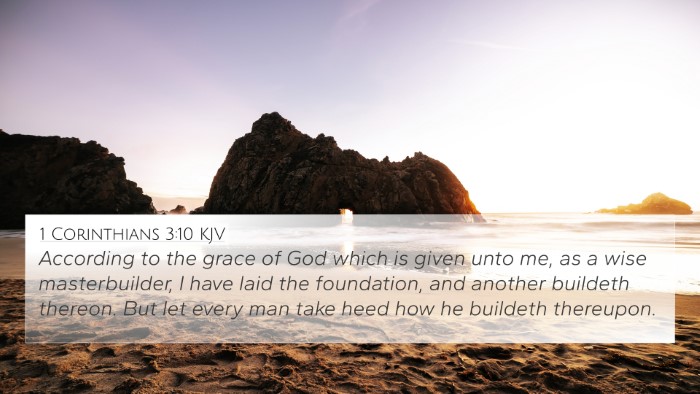
1 Corinthians 3:10 (KJV) »
According to the grace of God which is given unto me, as a wise masterbuilder, I have laid the foundation, and another buildeth thereon. But let every man take heed how he buildeth thereupon.
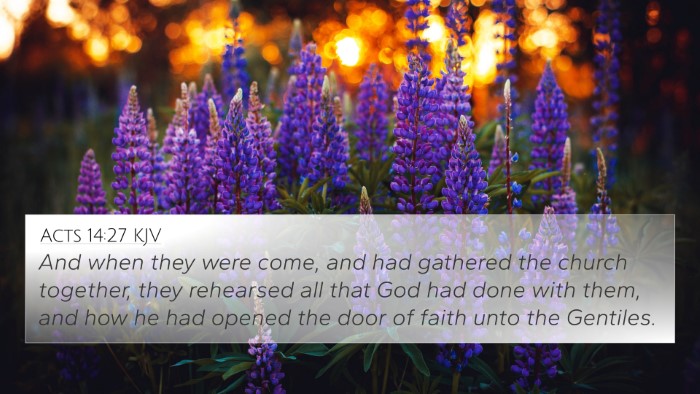
Acts 14:27 (KJV) »
And when they were come, and had gathered the church together, they rehearsed all that God had done with them, and how he had opened the door of faith unto the Gentiles.

Acts 15:16 (KJV) »
After this I will return, and will build again the tabernacle of David, which is fallen down; and I will build again the ruins thereof, and I will set it up:

Matthew 16:18 (KJV) »
And I say also unto thee, That thou art Peter, and upon this rock I will build my church; and the gates of hell shall not prevail against it.
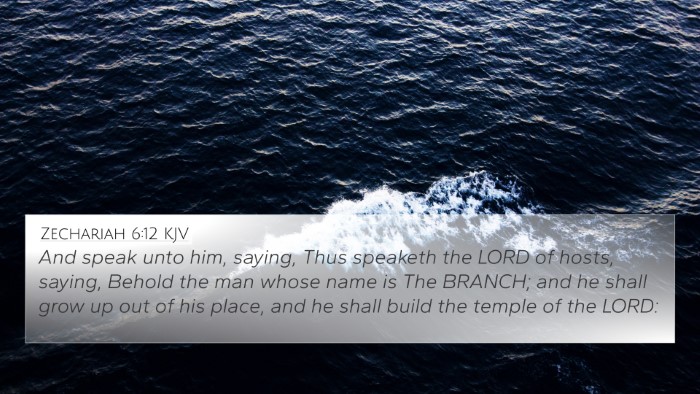
Zechariah 6:12 (KJV) »
And speak unto him, saying, Thus speaketh the LORD of hosts, saying, Behold the man whose name is The BRANCH; and he shall grow up out of his place, and he shall build the temple of the LORD:
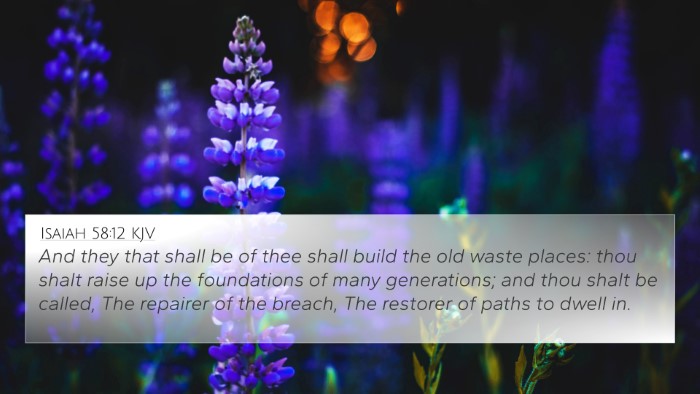
Isaiah 58:12 (KJV) »
And they that shall be of thee shall build the old waste places: thou shalt raise up the foundations of many generations; and thou shalt be called, The repairer of the breach, The restorer of paths to dwell in.

Isaiah 60:17 (KJV) »
For brass I will bring gold, and for iron I will bring silver, and for wood brass, and for stones iron: I will also make thy officers peace, and thine exactors righteousness.
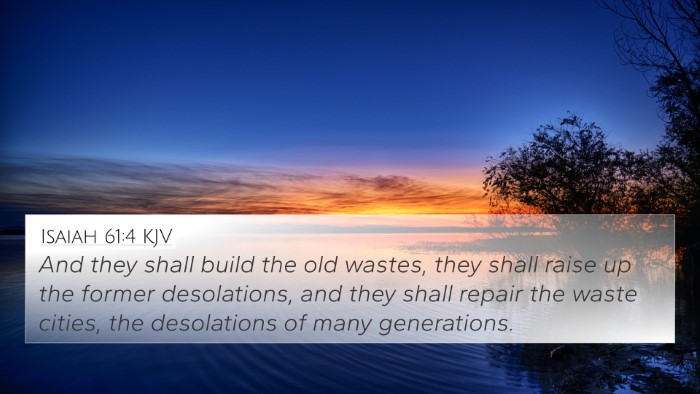
Isaiah 61:4 (KJV) »
And they shall build the old wastes, they shall raise up the former desolations, and they shall repair the waste cities, the desolations of many generations.
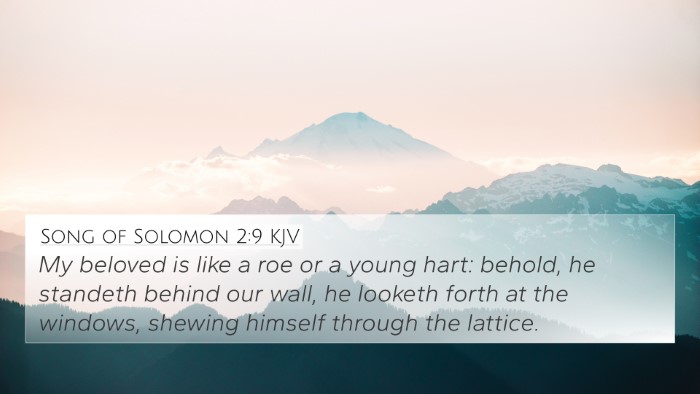
Song of Solomon 2:9 (KJV) »
My beloved is like a roe or a young hart: behold, he standeth behind our wall, he looketh forth at the windows, shewing himself through the lattice.
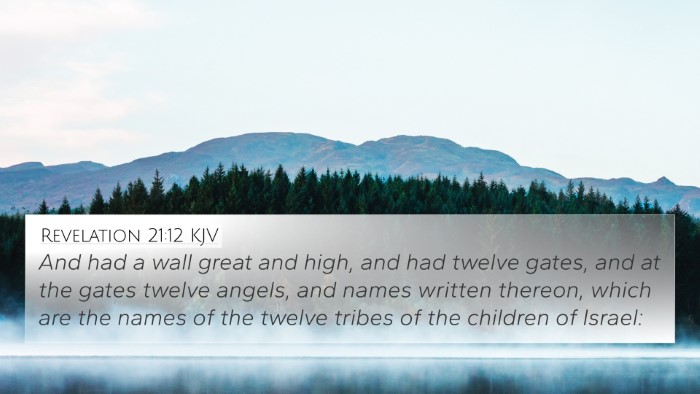
Revelation 21:12 (KJV) »
And had a wall great and high, and had twelve gates, and at the gates twelve angels, and names written thereon, which are the names of the twelve tribes of the children of Israel:
Song of Solomon 8:9 Verse Analysis and Similar Verses
Understanding Song of Solomon 8:9
Verse Context: Song of Solomon 8:9 states, "If she is a wall, we will build upon her a palace of silver; and if she is a door, we will enclose her with boards of cedar." This verse highlights the nuances of love and relationships, utilizing the metaphor of structural integrity and beauty to convey deeper sentiments.
Summary of Interpretation
This verse from the Song of Solomon can be viewed as a poetic expression reflecting the dynamics of love and intimacy. The concepts of a wall and a door symbolize different aspects of relationships—protection and vulnerability. The involvement of constructing a palace or enclosing her with cedar boards suggests a commitment to nurturing and valuing that relationship.
Insights from Public Domain Commentaries
-
Matthew Henry:
Henry interprets this verse as an indication of the strength and stability that love provides. He emphasizes that regardless of whether the beloved is a wall (a symbol of protection) or a door (a symbol of openness), love seeks to enhance and beautify these qualities.
-
Albert Barnes:
Barnes draws attention to the relational dynamics, explaining that the wall represents a protective barrier that allows for a flourishing relationship. He connects this to the commitment of the lover to either build upon this strength or to carefully protect the door’s entryway, signifying trust.
-
Adam Clarke:
Clarke elaborates on the contrasting qualities of security (the wall) and intimacy (the door). He interprets the verse as a reflection of the balance required in relationships—where love must both be protective and permit vulnerability.
Cross-References for Deeper Study
This verse resonates with several biblical themes and concepts found throughout scripture. Below are key verses that share thematic or conceptual parallels:
- Proverbs 4:23: "Keep your heart with all vigilance, for from it flow the springs of life." – Emphasizing the importance of guarding one’s heart, akin to the wall metaphor.
- 1 Corinthians 13:4-7: "Love is patient, love is kind..." – A description of love that aligns with the nurturing aspect of building a palace.
- Psalm 91:1: "He who dwells in the secret place of the Most High shall abide under the shadow of the Almighty." – Reflecting the protection offered within love.
- Matthew 7:7: "Ask, and it will be given to you..." – Relates to the openness and receptivity akin to the door metaphor.
- Song of Solomon 2:15: "Catch the foxes for us, the little foxes that spoil the vineyards, for our vineyards are in blossom." – Indicates the mutual care needed in relationships, similar to the protection implied in verse 8:9.
- Philippians 1:9-10: "And it is my prayer that your love may abound more and more..." – Highlighting the growth and strength of love.
- Galatians 5:22-23: "But the fruit of the Spirit is love... self-control." – Suggesting that love leads to careful management of boundaries and openness.
Thematic Connections
Song of Solomon 8:9 can be linked thematically with key themes throughout the Bible, such as:
- Love and Commitment: The nurturing quality displayed speaks volumes about the commitment that love requires.
- Protection and Vulnerability: The balance between security and openness is a critical theme addressed in various scriptural texts.
- Trust: Both metaphors (wall and door) reflect the need for trust in relationships, which is foundational to love as depicted in Jesus’ teachings.
Conclusion
In conclusion, Song of Solomon 8:9 encompasses rich metaphorical language that illuminates the complexities of love. It invites readers to consider the interplay of strength and vulnerability in their relationships, corresponding beautifully to many other biblical texts. For those seeking a deeper understanding of this passage, cross-referencing related verses enriches the study through the exploration of recurring themes and insights across scripture.
Tools for Bible Cross-Referencing
To enhance your understanding and study of biblical texts, consider utilizing tools for Bible cross-referencing such as:
- Bible Concordance: A comprehensive index of words and their locations in the Bible.
- Bible Cross-reference Guide: Resources that provide linkages between verses.
- Cross-reference Bible Study: Methods that explore parallels between scriptures.
Further Study Recommendations
To develop a deeper relationship with the texts and their meanings, delve into techniques such as identifying connections between the Old and New Testament, and engaging in thematic Bible verse connections. This will provide a more intuitive grasp of how verses reflect and echo one another throughout the biblical narrative.


